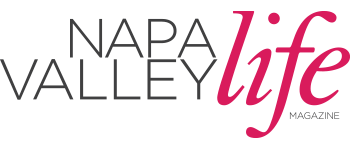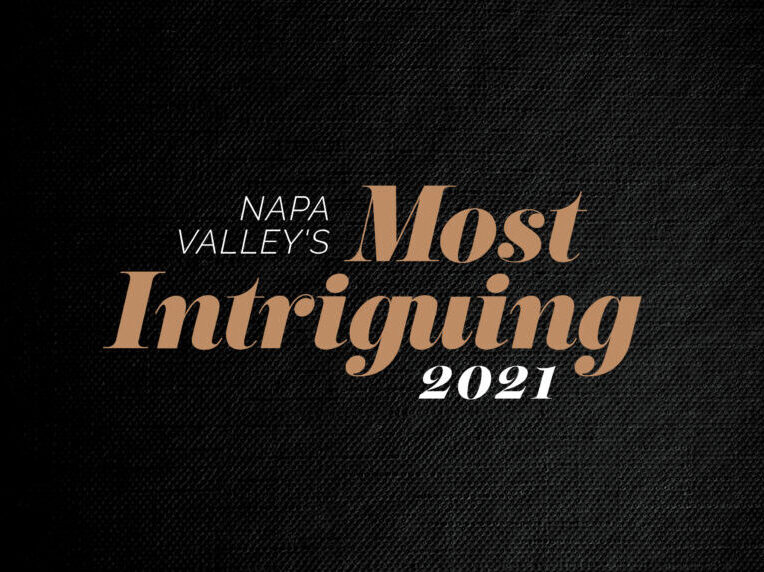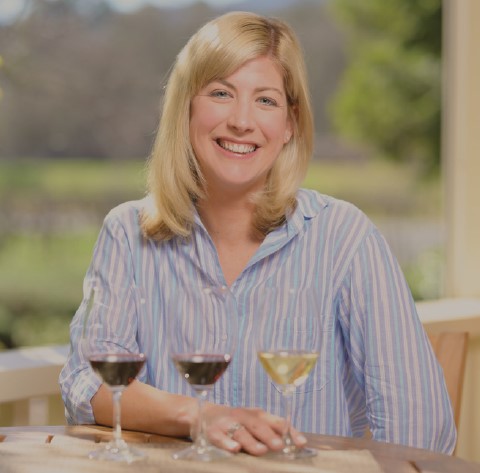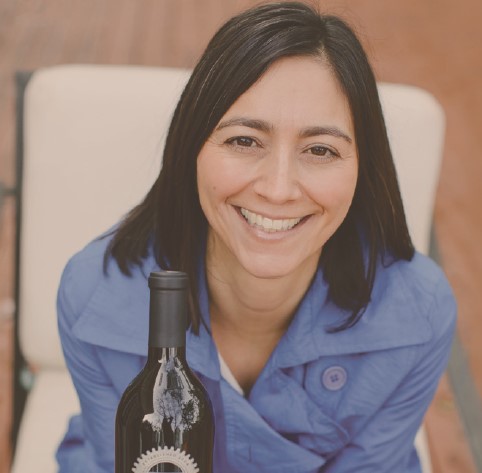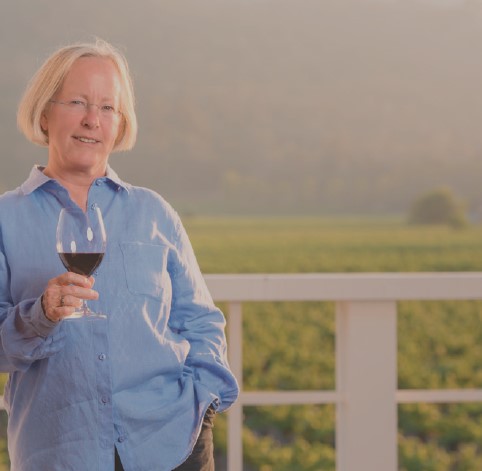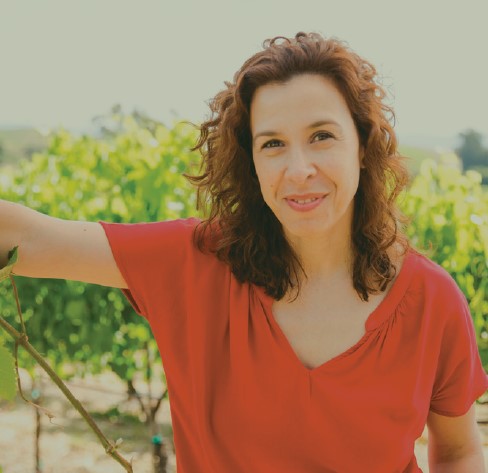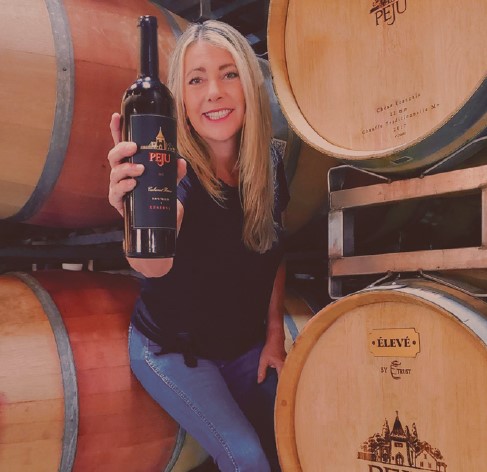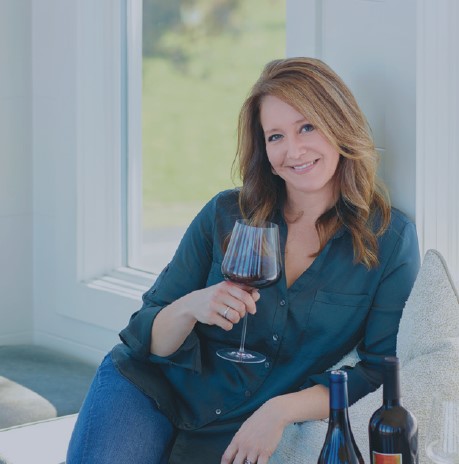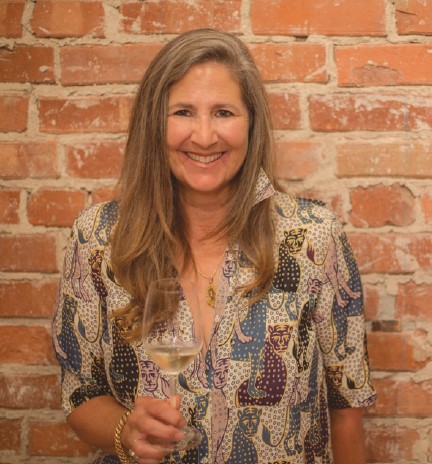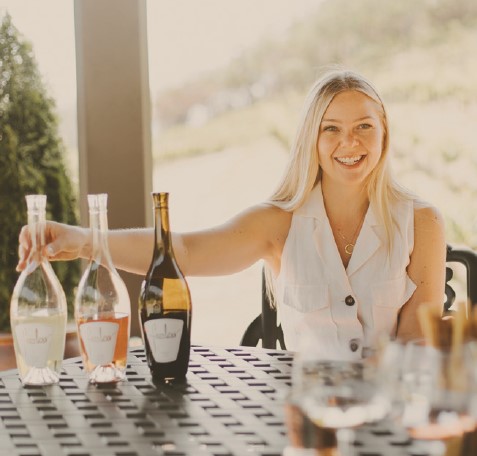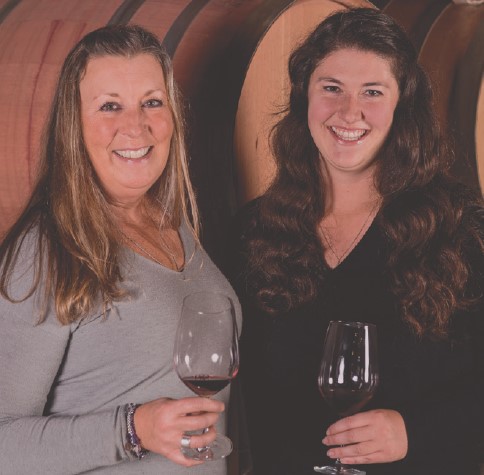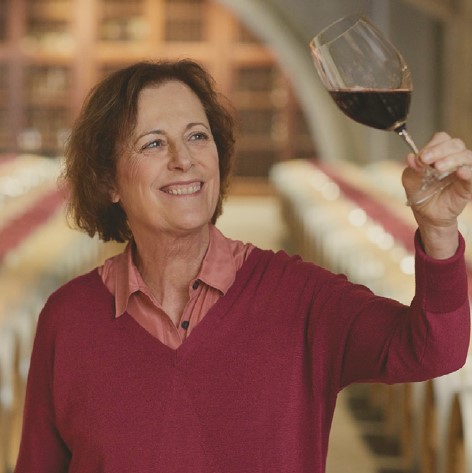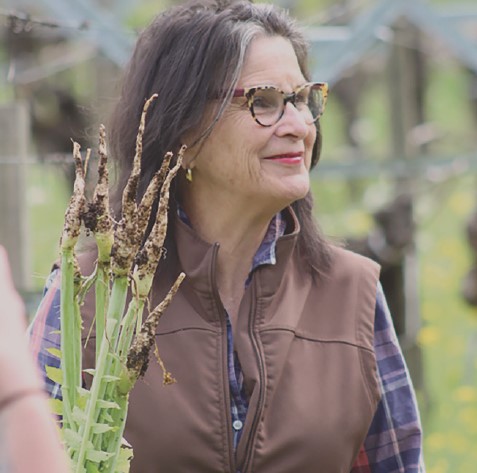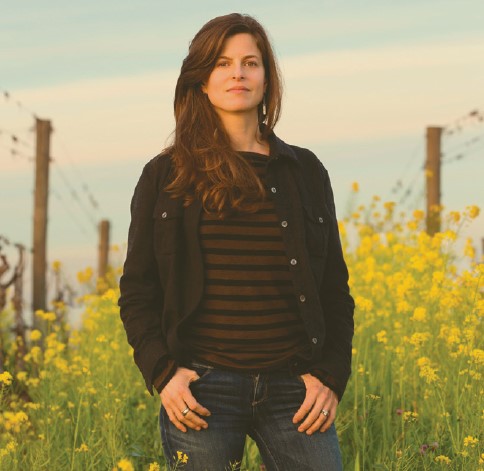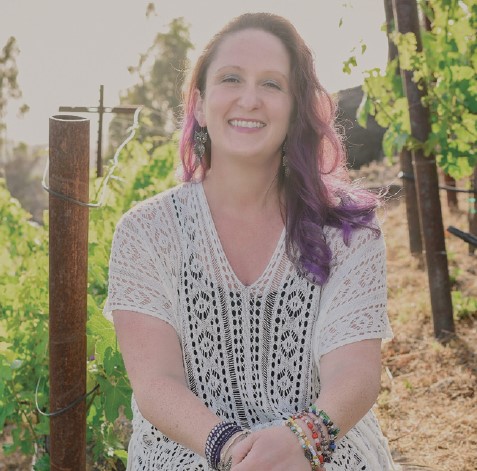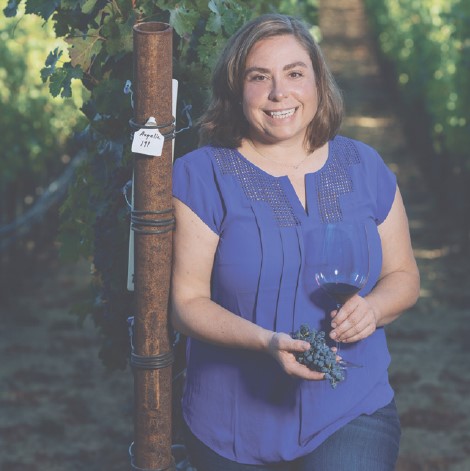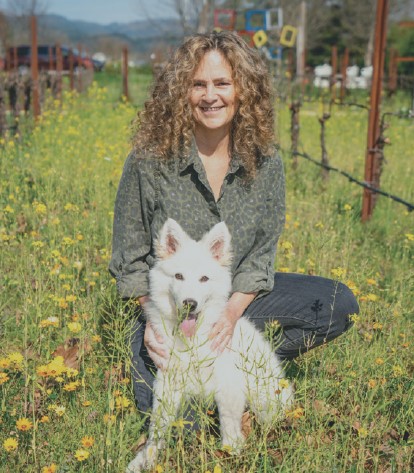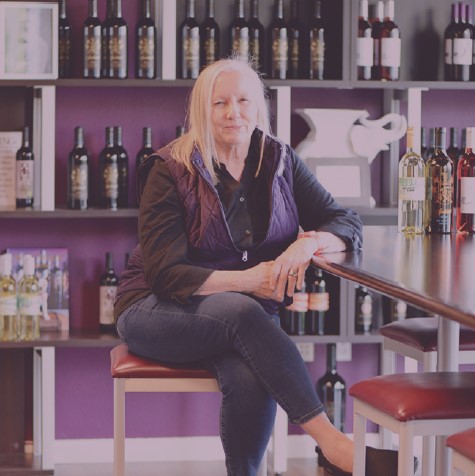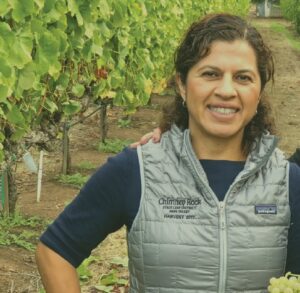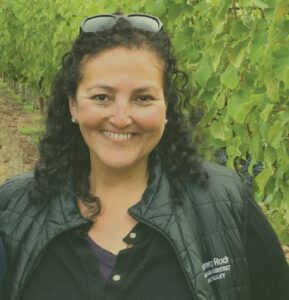Women and winemaking in Napa Valley began with a storied past when in 1882, Hannah Weinberger unexpectedly became proprietor and winemaker of J.C. Weinberger Winery after a disgruntled employee murdered her husband. The business prospered under her management, and she went on to gain notoriety when she entered her wine in the prestigious 1889 Paris Exposition wine competition and won the silver medal. She was lauded as the first woman in California to do so, an act that resulted in a dynamic shift in the perception of women as winemakers in the early days of the burgeoning wine industry.
Since that eventful date, up until the early 1960s, women became more involved in winemaking but taking on leadership roles mostly evolved out of necessity, usually after the death of a spouse. But in 1965, when Mary Ann Graf became the first female to receive an enology degree from UC Davis, she earned her place as the first woman winemaker of the modern era. During the next couple of decades, an esteemed list of women winemaking pioneers followed, such as Zelma Long, Barbara Lindblom, Merry Edwards, Sandra Belcher, Alison-Doran Green, Cathy Corison and Heidi Barrett, just to name a few.
Interestingly, while many women vintners transitioned to their careers beginning in the lab, even with the same education and credentials as their male counterparts, the cellar work was always considered a “man’s job,” creating a gap for women to become proficient at their craft. It wasn’t until a century later, in the 1980s, that women started to break those barriers and take on more leadership roles as head winemakers, winery owners, and even producing their own labels. Over time, as their talents were more appreciated by the wine industry and embraced by wine consumers, they were given opportunities to leverage their craft to consult and create premium caliber wines for other wineries.
In our Intriguing People issue this year, we’re proud to present some of Napa Valley’s current day distinguished women winemakers. The list includes some of Napa’s early pioneers and some exciting newcomers. While women have made significant progress in this field since Hannah Weinberger carved out her place in history almost 140 years ago, they still only represent a small percentage of California’s winemakers. As a result, every single one of them is still considered a trailblazer in the industry.
RENÉE ARY
VICE PRESIDENT OF NAPA VALLEY WINEMAKING,
DUCKHORN WINE COMPANY & DUCKHORN VINEYARDS WINEMAKER
Can impaired vision make for a better winemaker? In Renée Ary’s case, it is decidedly so. Ary, vice president of Napa Valley winemaking for Duckhorn Wine Company, and winemaker for Duckhorn Vineyards, started wearing glasses at age six. As her eyesight continued to decline over the years, she was at one point considered legally blind. “My husband tells me I have the ears and nose of a dog, and I think that’s helped me as a winemaker,” laughed Ary, who eventually received Lasik treatment to correct her impairment. A graduate of St. Mary’s College in Moraga, with degrees in Chemistry and Art, Ary had no idea she would end up in winemaking. She entered the industry through the lab, working at Robert Mondavi Winery as a technician; she believed she would open a wine lab one day. “I became enamored with the winemaking side because it allowed me to use my chemistry and art background. I loved that it was both technical and creative. And I remember the energy that filled the valley once crush began; I fell in love immediately.” A few years later, in 2003, she joined the Duckhorn Vineyards team as the Lab Manager and worked several positions before moving into the head winemaker role in 2014. After 22 years in the industry, she continues to find harvest season the most enjoyable part of her job. Ary’s attention to detail and love of a good challenge are what set her apart. “You never know what Mother Nature will throw your way, and you have no control over the weather, so you need to be flexible and think on your feet,” said Ary, who enjoys kayaking, skiing, and swimming in her rare spare time. “The secret to great wine is quality fruit and finding the balance in each vintage. The secret to making great wine is a combination of timing, being present, and paying attention to the many little details.”
LAURA BARRETT
WINEMAKER, CLIF FAMILY WINERY
A Boston native, Laura Barrett grew up in a family that drank two-for-ten (said with a thick Boston accent); aka two bottles for $10. “Wine was not part of my upbringing or family,” said Barrett, whose interest in viticulture originated within an academic setting. She studied science in college and specifically became interested in fermentation science, desiring to understand how wine was made. After college, she traveled to New Zealand, landing at Stonyridge Vineyards, just outside Auckland, where she worked in the vineyard, winery, and tasting room for a year. “It was there that I knew I wanted to pursue a career in wine,” said Barrett, a cooking, hiking, yoga, and skiing enthusiast. “Wine life was fun, challenging, interesting, and pulled all the pieces together for me.” Before post-grad work in Western Australia, she returned to the US to attend a master’s program at UC Davis while working harvests at the Napa Wine Company. She then took a position as assistant winemaker at Fisher Vineyards, where winemaker Mia Klein taught Barrett patience in the vineyard and cellar during her five-year tenure.
In 2014 she started working at Clif Family with a vineyard-driven approach and a focus on organic farming. “Our estate vineyards and farm are both CCOF certified organic, and we make every effort to source grapes from organically farmed vineyards.” Her secret to a great wine is balance, which begets elegance. “White wine, red wine, big wine, light wine—they all need a balance of acid, tannin, alcohol, and fruit to be great.” Barrett loves the seasonality of the wine business. “There is so much excitement that comes from each piece of the process – the harvest season, blending, bottling, the start of the growing season. Things are always changing, whether it be month to month or vintage to vintage, and that keeps work fun and exciting.”
CATHY CORISON
WINEMAKER/FOUNDING PARTNER, CORISON WINERY
Cathy Corison was studying biology at Pomona College when she took a non-credit wine appreciation class on a whim. “I fell in love with wine for all the usual reasons (it makes food taste better and vice versa, and you share it with friends and family) but, for me as a biologist, there was another layer,” said the 35-year proprietor and winemaker of her eponymous winery. “Wine is infinitely fascinating as a product of a series of living systems. Wine is alive.” After graduation in June 1975, she arrived in the Napa Valley. Her first jobs were at a wine shop/wine bar in St. Helena and in the tasting room at Sterling, all while regularly driving to UC Davis to clean up prerequisites for the master’s program in enology. After earning her master’s degree in 1978, she interned at Freemark Abbey Winery. “My fellow students and I were blessed with perfect timing. The Napa Valley was just digging its way out of a massive hole caused by Prohibition, two World Wars, and the Great Depression. In the mid-1960s, the wine industry expanded explosively, spurred on by the Paris Tasting in 1976. By the time we got out of school, there weren’t enough little old winemakers to go around, so there was so much opportunity for young enologists.” After her internship, she became winemaker at Yverdon on Spring Mountain before moving on as winemaker at Chappellet during the 1980s and ultimately founding Corison Winery in 1987. She became a private pilot during this time, learning to fly single engine airplanes in Angwin and gliders in Calistoga. At each winemaking venture, she has felt fortunate to be able to pursue her personal stylistic goals. “I love growing grapes and making wine; I learn something new every day.” Corison, an avid cook, quickly points out that there would be no Corison Winery without her husband of nearly 30 years, William Martin. “His skill-set is broad and complementary to mine, filling in most of the remaining positions in a small family farm/winery including a knack for long-term thinking around development,” said Corison. “Among many other things, he is the department head of IT, accounting, repair and maintenance, bottling, acquisitions, and finance. And he also drives a mean forklift.”
ANA DIOGO-DRAPER
DIRECTOR OF WINEMAKING, ARTESA VINEYARDS & WINERY
Born and raised in Portugal, Ana Diogo-Draper moved to California to pursue her winemaking dreams after studying at the University of Évora with Paulo Laureano, one of the biggest names in Portuguese winemaking. “The fact that Professor Laureano did not have an academic approach to winemaking, but a very practical, hands-on vision of what winemaking should be, got me hooked from day one,” said the director of winemaking at Artesa. “At the end of that term, I decided that I wanted to become a winemaker.” After several harvest internships in Portugal where she assisted in research projects and focused on micro-vinifications, she found her way to California. “Working on micro-vinifications has tremendously shaped how I approach winemaking to this day. I quite like to dissect and divide our Estate Vineyard blocks, fermenting and aging them separately.” Driven by experimentation, Diogo-Draper revels in winemaking trials, some formal, others purely influenced by curiosity and the chance to learn something new. An instinctive winemaker, she trusts her intuition. “It serves me well, most of the time. While walking through the rows of a particular vineyard block, tasting those grapes as they mature throughout the growing season, I have a vision of what that wine could be and start plotting on how to achieve it.” She finds harvest to be both the most rewarding and the most challenging time of the year. “At Artesa we have a really long harvest, starting in early August with sparkling, jumping straight into Chardonnay and Pinot Noir, and then all the ‘Big Reds.’ It challenges everyone in the production team to work non-stop for more than three months, but I’m always in awe of our incredible crew and how they push through the crazy hours and many days.” For Diogo-Draper, great wine is a wine with a sense of place, verve, and authenticity. “It means understanding the terroir with which one is working, and as the winemaker, having an approach that enables those grapes to showcase their potential. At times it entails a minimalistic approach; others, to be more interventive in the cellar.”
SARA FOWLER
VICE PRESIDENT OF WINEMAKING AND OPERATIONS, PEJU WINERY
Sara Fowler joined PEJU in 2006 and, ever since, has supervised the farming of the winery’s six estate vineyards throughout Napa Valley. She successfully transitioned the PEJU Rutherford estate vineyard to their organic certification and supports green initiatives within both the vineyards and the winery. Raised on a 400-acre organic ranch where at age 12, she was driving the family tractor, Fowler well understood farming from an early age. An art major and a talented creator of mixed media works, she at one time believed she might become a professional artist. But after working harvests and summers at Kendall-Jackson, where her mother worked the tasting room and volunteered her daughter for the bottling line, Fowler pivoted to viticulture, with an understanding that it too requires artistry. “When it was clear that I was most likely going to starve as an artist, I realized that I could make wine for a living and still be artsy,” said Fowler. “I love the creative aspect of winemaking, being able to shepherd/coax grapes into a delightful glass of wine that may be enjoyed with family, friends, and food. In addition, I love the cyclical nature of the business. I love being up to my eyeballs with grapes during energy-filled harvests, tasting through individual lots, and then working to create final wine blends and the sales aspect of going around to share the wines I’ve made. This gives me a great sense of pride.” When not at the winery, Fowler can be found traveling, eating, drinking, socializing, cooking, gardening, reading, walking her dog, and dancing every chance she gets. Fun fact: she loves a good dress-up theme party and owns dozens of tutus and wigs.
MEGAN GUNDERSON
VICE PRESIDENT OF WINEMAKING, HALL FAMILY WINES
Megan Gunderson’s ‘a-ha’ wine moment took place upon college graduation when she began searching and applying for positions within the wine industry. “I landed a phone interview for a harvest laboratory position at Robert Mondavi Winery, filling in for an individual named Gustavo who was going to work a harvest in Italy,” explained Gunderson, a biochemistry and molecular genetics double major. “The St. Peter, Minnesota college from which I was about to graduate was named Gustavus Adolphus. The interviewers took that as a sign and offered me the job. So I graduated, packed my car, and drove to Napa for the harvest of 2001!” Later, she joined St. Supéry in Rutherford as laboratory manager, and then moved to Dominus Estates in Yountville, where, inspired by the complexities of the Napa Valley appellations and sub-appellations, she developed her meticulous approach to winemaking. In 2005, she was hired as an enologist with HALL Family Wines. Two years ago, she was promoted to vice president of winemaking, spearheading all winemaking efforts for HALL, WALT, and BACA Wines. Her interest in wine originated during her senior year in college. “My biochemistry professor used fermentation to demonstrate certain biochemical pathways – resulting in a delicious end-product that truly fascinated me. I started researching the science behind winemaking; it’s so complex. Winemaking seemed like a great way to turn my chemistry passion into a fun and challenging career.” She feels her educational background and diverse skill set are what set her apart from other winemakers, as well as her eagerness, open mind, willingness to experiment, and thorough attention to detail – all of which help guide her. She believes in great vineyard sites, minimal intervention, and allowing her wines to express the terroir. “I get such joy sharing the finished product with people. There is so much that goes into producing a wine, and to me, it’s extra special when it tastes exceptional.”
SHARON KAZAN HARRIS
OWNER/WINEMAKER RARECAT WINES
Sharon Kazan Harris remembers the exact moment she knew she wanted to be a winemaker. “It was November 1983,” said the owner and director of winemaking for RARECAT Wines and one of Worth Magazine’s ‘29 Most Groundbreaking Women Changing the World.’ “I was invited to spend the day with Monsieur Delmas of Chateau Haut Brion. I tasted the 1982 out of barrel, and that was it.” She was 20 years old, studying economics at the Université de Bordeaux, where she would return in 2004 and graduate with honors from the famed D.U.A.D. program, a technical oenology diploma taught in French. In 2008, she launched RARECAT Wines, where she combines her French wine degree with a California spirit, making elegant, balanced, and complex varietals in Napa, Bordeaux, Champagne, and Russian River. “Most people have long lists of accolades that define their life’s successes,” said Harris, who came up with the name of her winery via a 3:30 am Urban Dictionary search after four failed trademark attempts. “For me, it is quite the opposite; my success has been a result of fortuitous introductions, dreaming big (with the ability to make ideas happen), and a willingness to try new things. I longed to be in the wine industry for decades, but getting to Napa Valley was like driving on a windy, country road versus a toll highway. I spent years working in executive positions in publishing, advertising, and technology. Luckily, a successful tech career allowed me to trade computers for vineyards.” While promoting RARECAT, Harris’ greatest passion has been empowering women, promoting diversity, and forging meaningful connections. “I have used wine as a tool to bring together thousands of executives to connect with their stakeholders. My love of food and wine directly stems from naïve gumption, charm, and a desire to learn.”
CHELSEA HOFF
WINEMAKER/OWNER, FEARLESS WINES
Similar to the wines she crafts, Chelsea Hoff’s winemaking style is globally influenced. Hers is a culmination of old-world winemaking practices paired with the creative drive discovered in new-world wines. Her story defines a new age of winemakers paving their own path motivated through fearlessness. Hoff’s fearlessness is illustrated by her ambition to travel at a young age and study under the finest wineries in the world like Château Smith Haut Lafitte in Bordeaux, France and at Charles Melton Wines in the Barossa Valley in Australia. It expresses her creativity in utilizing lesser-known grape varietals she discovered abroad in a region proudly defined by Cabernet Sauvignon. “I loved living abroad and learning the rich history of winemaking in Italy, France, and Australia,” said Hoff of the experiences that helped her to become the person and winemaker that she is today. Upon her return from Australia, she interned at her parent’s Fantesca winery alongside winemaker Heidi Barrett. Over the next couple years, Hoff continued to work with other highly-regarded winemakers in Napa Valley while moonlighting on her own project, Fearless Wines. In 2019, she took a leap of faith and devoted all her energy to her label. Today, Fearless Wines features the distinctive, lesser-known grape varietals that Hoff discovered abroad, like Chenin Blanc and Grenache. These unique varietals, crafted into a Blanc, Rouge, and Rosé, have garnered a strong following of consumers eager to try something new. “I started Fearless Wines with a goal to do things differently and buck the status quo that exceptional wine crafted in Napa Valley is limited to Cabernet Sauvignon,” said Hoff. “What we’ve accomplished with Fearless is a truly exceptional wine at a very reasonable price. I believe if you are passionate about something, you will be successful, and if you truly enjoy it, it will never feel like work!”
KIMBERLEE NICHOLLS &
ABIGAIL HORSTMAN
WINEMAKER AND ASSISTANT WINEMAKER, MARKHAM VINEYARDS
Markham’s winemaker Kimberlee Nicholls and assistant winemaker Abigail Horstman connected over their love of science and cooking and a shared intuition that continues to guide their winemaking. Self-described ‘soil nerds,’ the pair also share a sense of humor, never taking themselves too seriously. “We have diversity in perspectives based on our different experiences,” said Nicholls, who celebrates her 29th harvest with Markham this year. “I have a degree in biology, not enology. So I learned winemaking by doing it. The winery was my classroom. Abi learned winemaking at UC Davis and by working harvests around the world, in Italy, New Zealand, and Israel. Together, our diversity creates a harmonious relationship.” Their secret to a great wine is spotlighting the vineyard, something for which Markham prides itself. “To make excellent, high quality, food-friendly wines, you need great grapes,” said Horstman, for whom Markham’s focus on producing single-vineyard and appellation Bordeaux varietals was refreshing. “And then we allow the grape varietal to shine through while infusing each wine with a bit of our personalities.” The duo is currently working together on the vintage 2019 blend of The Character, Markham’s icon wine. “We craft this Bordeaux-inspired Red Blend in the “Right Bank” style, where Merlot takes center stage in a beautifully balanced profile, allowing all five Bordeaux varietals to harmonize together in the best wine from our cellar every vintage, said Nicholls.” When asked their favorite part of their jobs, the pair answered in unison, “Blending, tasting, and the people with whom we work.” Said Nicholls, “Any winemaker is looking for someone to understand what they’re trying to do when they’re making wine. Abi grasped very early on, with an intuition of the birds-eye view of winemaking – seeing how everything works from the status of fruit in the vineyards to finishing the wines at the end of the maturation process. And when you have the right people, you can taste that in the wines. The wines reveal that harmony.”
GENEVIÈVE JANSSENS
CHIEF WINEMAKER, ROBERT MONDAVI WINERY
Geneviève Janssens knew very early on that she wanted to be a winemaker. Her family owned and operated a winery in the South of France, where she grew up amongst the vines, observing her father’s every move. She learned everything she could from him before studying enology at the University of Bordeaux in France. Upon graduation, Geneviève opened her own enology laboratory in Provence, serving as a consulting enologist to many French chateaux. Her California winemaking journey began in 1978 at Robert Mondavi Winery. “I really connected with Mr. Mondavi’s philosophy on winemaking and winegrowing,” said Janssens, who has overseen the winemaking at the iconic winery for 25 years. “I saw parallels between my father’s holistic approach, and this brought great comfort to me.” Janssens and Mondavi connected over their shared belief in the power of terroir. “The secret to making exceptional wine is always the soil, the terroir. You cannot make exceptional wine without this, and this was something Mr. Mondavi understood and why he had the vision to produce wines from our To Kalon Vineyard that would be some of the very best in the world. That is my winemaking secret: focus on terroir first. Great wine will follow.” Her other secret is her team. “I believe that great wine can only come from a great team. This includes the vineyard team, winemaking team, cellar team, and more. My role as chief winemaker is to pull all of the teams together and keep them focused on one goal: making the best possible wine.” Asked what she most enjoys about her chosen profession, Janssens answered, “I love sharing each vintage with our customers and witnessing the memories they create with our wines. I find great joy in expressing myself creatively and in helping others. There is nothing better than bringing something beautiful into the world and sharing that with others.”
JULIE JOHNSON
OWNER/WINEMAKER, TRES SABORES
Julie Johnson believes in the serendipity factor when it comes to great wine. “Sometimes something unexpected turns into something great,” said the winemaker and owner of Tres Sabores. “Being open to the possibilities is important.” She mostly believes that great wines result from healthy soils and habitats, and that’s where she puts most of her energy. “It also definitely helps to really love food and wine.” Johnson suckered her first vine in the Finger Lakes region in 1978; she co-founded Frog’s Leap in 1981, working creatively as the sales, marketing, and garden manager, and then started Tres Sabores in 1999, where as sole proprietor she wears more hats than she can count. “I had been tasting for years while at Frog’s Leap even though I wasn’t a part of the specific process,” said Johnson, a proud grandmother to four. “When I launched the Tres Sabores project in 1999 with Rudy Zuidema, Ken Bernards, and Karen Culler making the wines from our estate Zinfandel vineyard, I eventually became the cellar hand. They taught me so very much. My soon-to-be husband, Jon Engelskirger, offered that it probably was time to try my hand at actually making the wine. It was all about “ love and osmosis” with a lot of guidance from friends, various classes, and a fair amount of hutzpah!” She finds that which is most challenging about winemaking also to be the most enjoyable. Her current challenge is fully transitioning to regenerative farming at her ranch while learning all she can about systems management, such as taking tasks apart and putting them back together in the most efficient, resource sensitive (both human and environmental), thoughtful ways possible. “The key goals are always rooted in producing the finest wines possible.” Johnson’s winemaking ‘a-ha’ moment wasn’t so much a surprise revelation as it was about a general acknowledgment that winemaking could be a vocation. “Or,” she said, “realizing that perhaps I had always been a winemaker at heart.”
HELEN KEPLINGER
PROPRIETOR, KEPLINGER WINES & VERMILLION WINE
When she first moved to California from Boston, Helen Keplinger knew no one in the wine industry. “I had a lot of trouble finding my first job,” said the Ohio native who was raised within a wine and food-loving family. “I was an outsider with no experience and had a really difficult time finding a job. Finally, Rob McNeill, then Winemaker at Mumm, took a chance on me. Similarly, after my first year at UC Davis, I had few replies to my job inquiries when I applied for my second job. Finally, Ren Harris, the owner of Paradigm Winery, was given my resume by Heidi Barrett, who said, “You need to hire this girl!” Luckily, he did!” Keplinger’s passion for wine was ignited upon reading the autobiography of Philippe de Rothschild, whose story struck a chord and led her to consider winemaking as a career. At the time, she was filling out medical school applications, which she abandoned in favor of applying to Davis’ viticulture and enology program. “I didn’t know for sure I’d made the right decision until I was working with Barrett at Paradigm and realized how fortuitous that whole series of decisions and moves had been.” She started her own brand in 2006 and is in the vineyards often throughout the growing season, preferring to work closely with the viticulturists and farmers, fine-tuning and understanding the sites and nuances of the vintage. “I am very hands-on and never do what is easy, just what needs to be done when it needs to be done. I aim to capture the best from each site every year, striking a balance between power and elegance in site-driven, expressive wines.” She is endlessly fascinated by her chosen profession, and she loves that every year is different, and the story of that vintage is told in the wines. “I truly love what I do, and it is never lost on me how lucky I am to have chosen winemaking as my vocation.”
SHAWNA MILLER
WINEMAKER AND PROPRIETOR, EARTHSHINE WINES
Shawna Miller ventured to the Napa Valley for a wine tasting day trip many years ago with her then college boyfriend, and the duo never left. Entranced with wine and the winemaking process, the Virginia Tech grads and forestry majors found themselves enchanted by the ancient mystique of wine and the science behind its creation. Miller first worked harvest in 2006, and ultimately received a winemaking certification from the UC Davis Extension program while working at a Napa winery. “The first day I worked in a winery, I thought it was the coolest job ever and I was hooked,” said Miller, who spent her 20s working harvests in both Napa and the Southern Hemisphere. “I traveled harvest to harvest to soak in all the information that I could.” Recently recognized by Decanter as one of the world’s most influential female winemakers, Miller ran the Luna Vineyards winemaking program from 2011 until the winery’s sale in 2021, when she created Earthshine Wines to continue producing soul-stirring wines from vineyards that warm her heart. Named for the astronomical term first coined by Leonardo da Vinci to describe the sun’s glow reflected off of the earth, illuminating the dark side of the moon, Earthshine wines focuses on small-lot Bordeaux varietals as well as food friendly Italian and off-the-beaten path wines. Miller’s goal is to let the best of Napa Valley reflect in each bottle. She counts herself fortunate to have been mentored by Napa winemaking greats, from whom she has developed her own approach. “Give the grapes all of your attention during harvest and guide them to be the best each vintage.” And her then boyfriend? He’s now her husband (Zak Miller), co-proprietor at Earthshine, who himself found a career in wine as sparkling winemaker at Domaine Carneros.
ANGELINA MONDAVI
MONDAVI SISTERS’ COLLECTION
Angelina Mondavi can’t remember a time when wine, vineyards, and harvest were not a part of her life. The wine industry scion – great-granddaughter of Cesare and Rosa Mondavi who bought Charles Krug Winery in 1943 – has been making wine for 18 years, and she just completed her 35th harvest. Yet despite her family’s inherent influence, it was while living in Australia she truly experienced her wine epiphany. “It was when I tasted a 25-year vertical of Moss Wood made by two generations of the same family (father and son duo),” explained Mondavi. “Tasting the consistency while noticing their different personalities come through the wine – that was my a-ha wine moment.” She was a mere ten years old when she started working at Charles Krug, taking on odd jobs and spending summers alongside her grandfather and sisters in the lab, where she discovered an affinity for science. “Having that opportunity to work side by side with my father and grandfather and learning their different winemaking styles has left a significant impression on me and has influenced the way I make wine today,” said Mondavi. She and her sisters Alycia, Riana, and Giovanna are active in the family’s CK Mondavi wine operation, and they have branched out with their own label, Dark Matter. “Our label gives us all the ability to express ourselves and lean on each other’s strengths in business to grow an excellent brand.” A minimalist, Mondavi’s winemaking technique involves patience and little intervention. The result is a balanced wine that lets the fruit stand on its own. Known as fairly serious, she tends to be a goofball during the long days of harvest and loves to make her team laugh. When not busy in the vineyard or winery, Mondavi enjoys cooking and finding unique ways to enjoy wine with food – which she usually shares with her mom and sisters. “Working alongside my family is the most enjoyable part of what I do.”
STEPHANIE PUTNAM
DIRECTOR OF WINEMAKING, RAYMOND VINEYARDS
Stephanie Putnam had always dreamed of becoming an FBI agent, but when she learned she was too short (4’11”), she knew she had to take another direction. An ‘introduction to winemaking’ class, taken as a UC Davis freshman, led to another path of equal passion, that of winemaker. Her interest in wine was peaked early on via her parents’ vinous interests. Putnam this year celebrates 12 years as director of winemaking at Raymond Vineyards. “When I graduated from college (with a B.S. in fermentation science), my parents celebrated with a bottle of Raymond Vineyards Cabernet Sauvignon,” said Putnam. “It was meant to be!”
Her first job out of college was in the cellars at Hess Collection, where she worked for one year as the first female cellar worker before being promoted to enologist. She grew with the company, ultimately holding the title of winemaker. She then spent eight years as winemaker at Far Niente Winery, where she contemporized their house style. At Raymond, where her focus is on high-end Cabernet Sauvignon and Chardonnay, she believes in the balance and harmony of a wine rather than tannin levels. She relies on patience while letting the vineyard and wine speak. “I love the seasonality of winemaking,” said Putnam, whose wines have won acclaim, including recognition in the Wine Spectator’s Top 100 and Wine Enthusiast’s Top 100. “It’s you against Mother Nature. Every year is different, and it keeps you on your toes and keeps everything fresh and exciting.”
A fan of scuba, Putnam spends her free time in the water and rejuvenates via diving vacations. “The peace and quiet of the water is a reset for me.”
BARB SPELLETICH
WINEMAKER/OWNER, SPELLETICH FAMILY WINE CO.
With 28 years under her belt as winemaker at Spelletich Family Wine Co., Barb Spelletich has helped countless vintners begin their lives and careers in wine. Formerly the proprietor of an importing and distributorship in Seattle, Spelletich has lobbied tirelessly to permit bonded wineries to allow smaller, beginning wineries to produce wine and house their own bonded wineries on-premise. “It helps all of us and supports host wineries to survive the market ups and downs,” said Spelletich, who finds joy in educating others about wine. Her tours typically entail a sampling of new grape juice, that in the fermentation process, and a ready-to-press red wine. “This helps explain what it is we winemakers do and all the decisions or directions we can go on any of our wines. The more you know, the more interesting it is.” Spelletich’s wine love was nurtured by the tastings she hosted as a manager of a Seattle retail store. “In doing research, I fell in love with wine, all the varietals and growing regions throughout the world.” She ultimately took a job at Ste. Michelle in Washington, participating in harvest. She eventually made her way to Napa, working at St. Clement and taking classes at UC Davis. “Davis taught me the basics of fermentation, aging, blending, and bottling. Viticulture taught me the fundamentals of grape growing, cultivation, nutrition, weather, pests, clones, soils, and more. Winemaking takes experience in the vineyard and cellar. No way around it.” Spelletich’s secret to great wine is in growing healthy grapes and harvesting at just the right time. She blends with her husband Timothy and relies on family opinion. “We all have different palates; the more palates, the better.” Spelletich is grateful for the cohesiveness of the Napa wine community that has worked together the past several years to battle the effects of drought, wind, and fire. “It has been challenging,” admits Spelletich. “But when a guest tastes our wine and has that look on their face of ‘Oh, my god; this is amazing,’ I celebrate that moment.”
ELIZABETH VIANNA &
LAURA OROZCO
WINEMAKER/GENERAL MANAGER & ASSISTANT WINEMAKER, CHIMNEY ROCK
Elizabeth Vianna was living in New York City post-college, attending a Christie’s pre-auction tasting when she heard French winemaker Christian Moueix talking about the UC Davis Winemaking graduate program. Intrigued, she applied, got in, and the rest is history. 2022 marks her 20th year at Chimney Rock, 17 as winemaker, and ten as general manager. Her assistant winemaker is Laura Orozco, with whom she shares a devotion to the region despite disparate upbringings and interests. Orozco, whose father and uncles have worked in Napa Valley vineyards since the early 1970s, grew up amongst the vines and is a competitive athlete, always seeking the next physical challenge. Vianna, raised in Brazil, and a biology major at Vassar, was originally on a med-school track before discovering her love for wine. A patron of the arts with the belief that great art inspires winemaking, she spends her free time at museums, concerts, theater, or reading great fiction and poetry. Yet despite the duo’s differences, they find that their tastes and styles are well complemented. “I believe every winemaker brings a unique perspective based on their life experiences,” said Vianna, a classically trained pianist whose first great interest was music. “My Brazilian childhood, my love for music and art – these are the things that contribute to my uniqueness as a winemaker. I actually think about music when I blend; I find many parallels between the two.” For Orozco, the secret to a great wine is passion and care. She loves the doors that wine has opened, allowing her to meet people from all over the world, an appreciation shared by Vianna. “I quite love the passionate people in this business,” said Vianna, who values the winemaker connection to land and weather, and how each is reflected within wine. “I believe that great wines tell the tale of a great place and time in a pure way.”
